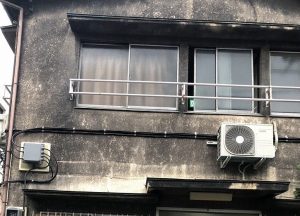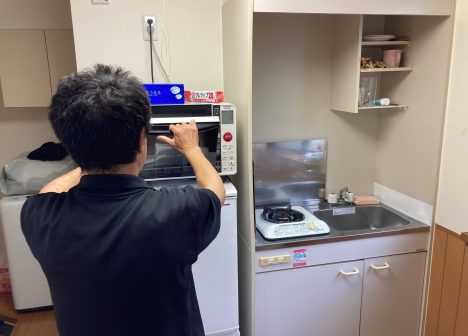Working so everyone may have a decent place to live, Habitat Japan engages in “Project HomeWorks”, a program that offers home cleaning/decluttering support to those in need as well as supporting those finding/entering new housing. As a registered housing support organization with the Tokyo government, Habitat Japan’s home finding initiatives help elderly households, low-income households, single parents, and those with disabilities who have trouble finding housing on their own. This support ranges from accompanying Home Partners to consultations, apartment viewings, and furniture shopping as well as periodic checkups after the fact when needed.
One of these Home Partners is Mr. Saito (pseudonym). Mr. Saito is in his early fifties but has been unable to keep up working due to a workplace injury he sustained as a young adult, so he now lives on welfare.
Influenced by his family, Mr. Saito became a fisherman in his twenties. While at sea he was caught in an accident and injured his neck and back. He was able to return to the ship and continue working with medical treatment, but sadly pain began to return in his forties and forced him to return to dry land. He was assigned to work as a forklift operator in a factory, but this job too began to take a toll on his body and he eventually had to quit.
With his savings running low, Mr. Saito believed that he had to focus on his health before he could support himself and went to his local welfare office for a consultation. A kind social worker there helped him move to Tokyo so that he could receive specialized medical care at a hospital there he had been referred to in the past.
 Mr. Saito moved to Tokyo alone without any appliances or furniture, and he didn’t have any family or friends in the area to help him. At the start of this year, he moved into public lodging in a run-down area of Tokyo after being introduced by his city ward office that was supporting his move. From his 5 square meter room with nothing but AC, a TV, and a futon, he devoted himself to recovery and frequented the hospital. At this lodging, bath facilities were shared and only available between 2-5 PM. It came with some difficulties, but Mr. Saito was able to meet his housing needs on welfare by paying 2,200 yen per night.
Mr. Saito moved to Tokyo alone without any appliances or furniture, and he didn’t have any family or friends in the area to help him. At the start of this year, he moved into public lodging in a run-down area of Tokyo after being introduced by his city ward office that was supporting his move. From his 5 square meter room with nothing but AC, a TV, and a futon, he devoted himself to recovery and frequented the hospital. At this lodging, bath facilities were shared and only available between 2-5 PM. It came with some difficulties, but Mr. Saito was able to meet his housing needs on welfare by paying 2,200 yen per night.
All was well until the weather began to get hotter. Around April, he started to notice cockroach-like bugs on his bedding. These were Tokojirami—Japanese bedbugs. And so, Mr. Saito’s battle with the bedbugs began. He took bug spray to the room, he cleaned his sheets and dried his futon in the sun, but the bugs persevered. Battered and bitten, Mr. Saito consulted with his case worker to see if he couldn’t make a move elsewhere in Tokyo. Once his move was approved, Mr. Saito began searching for help.
“I was worried about finding a place to live on my own” said Mr. Saito, noting how helpless he felt when he applied for the move. He learned about housing support organizations from a friend and called every organization in Tokyo. These organizations generally don’t support those under 65, but Mr. Saito kept trying until he made it to Habitat Japan and finally spoke with one of our team members. The day after, our team member met with Mr. Saito near his home, where he saw Mr. Saito’s arms and hands covered in countless red bug bites. After consulting with us, a team member accompanied him to the realtor and to apartment viewings. Since Mr. Saito is of sound mind and body, this particular case of housing support went by relatively smoothly. After being accompanied to buy furniture, Mr. Saito was able to begin life in a new space at the beginning of July without a hitch.
On his way home from the hospital for regular treatment, Mr. Saito was able to visit us at our office. When asked about life in his new home, he laid his feelings bare and told us “I’m nervous about how to live from now on”. Since beginning to receive welfare, this is his first time living alone in his own apartment. He told us that he was nervous about paying for his utility costs and food on what limited budget he had.
On the other hand, Mr. Saito told us that he’d be receiving a new kind of treatment in August and December and shared with us his hopes for the future. “Keeping an eye on how the treatment goes I might be able to work, so I’m thinking of looking for a part-time job. I think getting to a point where I don’t need treatment anymore and can start leading an independent life is the dream”.
We advised Mr. Saito to continue focusing on his recovery, and that should he need help in the future there are support groups including Habitat Japan willing to help. With that, we parted ways with Mr. Saito for the day. Working towards a world where everyone has a decent place to live, Habitat Japan will continue to provide support to and look after those in need, including Mr. Saito.



